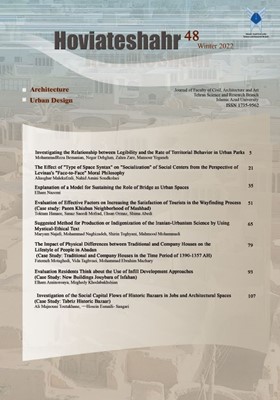Suggested Method for Production or Indigenization of the Iranian-Urbanism Science by Using Mystical-Ethical Text
Subject Areas : urbanismMaryam Najafi 1 , Mohammad Naghizadeh 2 * , Shirin Toghyani 3 , Mahmoud Mohammadi 4
1 - Ph.D. Candidate in Department of Urban planning, Najafabad Branch, Islamic
Azad University, Najafabad, Iran
2 - Assistant Professor, Department of Art and Architecture, Science and Research Branch, Islamic Azad University, Tehran, Iran.
3 - Assistant Professor, Department of Urban planning, Najafabad Branch, Islami
Azad University, Najafabad, Iran
4 - Associated Professor, Department of Art, Isfahan University, Isfahan, Iran.
Keywords: urbanism, mystical-ethical texts, theorization,
Abstract :
Implementing the urbanism science has increased recently in Iran. Utilization of this imported science in Iran without sufficient attention to has resulted in contemporary confused cities. These matters have motivated urbanism researchers to naturalize urbanism science through valuable old texts written by Muslim scholars. Up to now, "Nahj_al-Balagha", "Shahnameh of Ferdowsi", "Hafez's Divan", "Mosibatname of Attar", "Nasir Khusraw's Safarname", "Haft-Peikar of Nezami" and "Ibn Kaldun's Moghadame" have been used by researchers in the texts of urbanism or architecture. The titles, sentences, themes and contents of these texts were extracted and employed in urbanism texts. This article emphasizes on usage of old Persian texts for production or indigenization of urbanism science and offers the method for it. There are three steps to achieve this purpose.1) Firstly, two subjects were defined in the theoretical part:The process of science production was defined to include six stages: worldview, philosophy, paradigm, theory, model and phenomenon. The weakness in theorization is the most important issue in Iranian Urbanism. In addition, western science has mostly been imported to Iran from "theory" stage. Therefore, it's necessary to focus on "Theory" stage or "Theorization".Among different subjects of old valuable texts, "mystical ethics" is selected in this article, as mysticism and ethics had been employed in Iran's tradition cities. Also, Mystical ethics are matched with stages of "Islamic monotheism worldview", "Islamic philosophy" and "Islamic paradigm". Moreover, the goal of mystical ethics is personality prosperity and then social prosperity. 2) Secondly, In the A section, there is a way of "Theorization" that has been accepted by Muslim scholars. It has four levels: 1- the ideas, 2- discovery of the relationship, 3- description and expansion, 4- implementation.In the B section, there is an accepted method for usage a text. This famous method has been called "Zaherieh and Batenieh" and includes multiple steps.3) Finally, both of the processes ("Theorization" and "Zaherieh and Batenieh") are united to make up the final method for employing of old Persian texts in order to produce or indigenize the theories of Iranian urbanism. This method includes the following instructions.The brief rules in the texts of mystical ethics are used as "Ideas" in urbanism theories.The rules of mystical ethics have apparent and ambiguous meanings. So it's necessary to acquire them according to proposed method.It is necessary to create a relationship between the ethical code and urbanism subject. This step is called "discovery of the relationship". (The gained meanings in the previous stage will be of help to this step). There are two states in this part: if ethical rule has a relationship with existing theory, it would be transformed into a native theory; otherwise, a new theory should be created.The "expansion" stage includes enough description for growing up the hidden theory. One way is comparing ethics and the fact in the city. If there is a difference, the ethical code must be prevailed.The "implementation" step is suggested as a subject of a future article.
_||_

